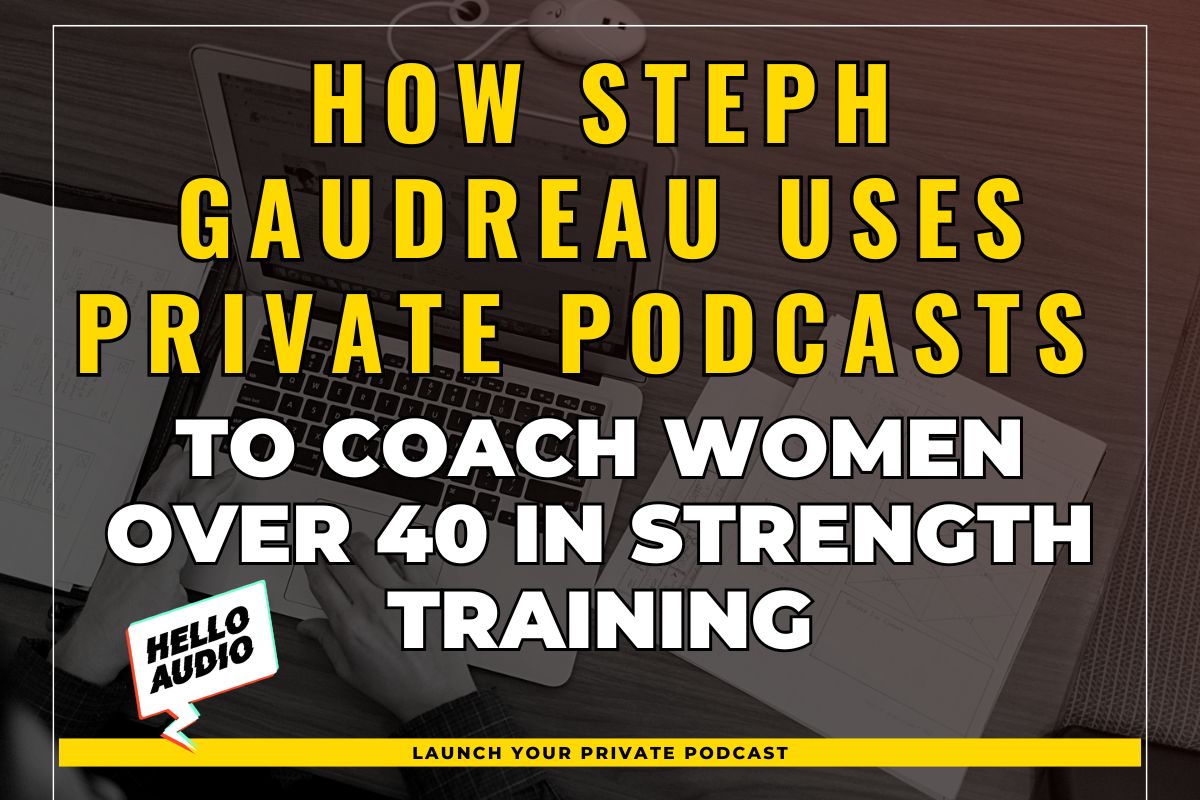Online courses have been around since the 20th century, but it was not until the COVID-19 pandemic that the sector grew exponentially.
With the plethora of tools available, you can now easily create an online course and enroll students globally.
Still, many tutors need help marketing their online courses to reach a large audience.
This article provides an overview of how to market online courses, including best practices, common mistakes, and suitable hosting platforms.
Need a quick solution for promoting your online courses to generate revenue?
With Hello Audio, you can turn your online courses into private podcasts that students can listen to on the go!
Our platform also exports your online course to platforms like Spotify and Apple to help you reach a wider audience.
Sign up for Hello Audio’s 7-day free trial – no credit card required!

Importance of Marketing Online Courses
Here are the main incentives for promoting your online course:
Global Reach
Unlike traditional courses that require physical attendance, students can attend online classes remotely.
As such, marketing your online course helps you attract learners from across the globe, increasing your enrolment rates.
Engagement with Potential Leads
Marketing is not solely about promoting your course. It also initiates engagement with your target audience.
For example, potential leads might interact with your post on social media, which helps boost your visibility and reach.
Access to Data-Driven Insights
Most digital marketing strategies provide performance analytics, which you can use to refine your efforts and monitor your ROI.
For instance, you can use surveys to assess what interested learners expect from your course.
Also, you can monitor how potential leads interact with specific course elements and curate the content to maximize engagement.
Credibility and Trust
Marketing your online course allows you to build social proof, encouraging potential learners to trust your business.
For example, sharing past students’ success stories and testimonials can attract potential learners to enroll in the course.
Authority Building
Highlighting your expertise, professional affiliations, and accreditation through marketing helps underline your credibility and qualification as a tutor.
It also creates networking opportunities with other educators and industry experts with whom you can partner to recommend your course.

How to Market Online Courses
Wondering how to market your online course? Follow our step-by-step guide:
- Define Your Target Audience: Identify the specific group of people you are targeting, including their demographics, educational interests, and pain points.
- Outline Your Unique Selling Points: Highlight what differentiates your course from your competitors, including the learning styles, instructor accreditation, and post-program certification.
- Create a Landing Page or Website: Create a visually appealing, user-friendly website that interested students can visit to learn more about your course. Ensure the landing page has clear call-to-action statements and buttons for lead conversion.
- Offer a Lead Magnet: Use freebies like ebooks, monthly newsletters, and mini-courses to attract potential students to your course. Freebies also help generate leads for more targeted marketing.
- Build an Email List: Use signup forms and subscriptions to compile a list of potential students. Leverage automated sequences to nurture the leads and guide them through the sales funnel.
- Utilize Content Marketing: Create valuable content to engage your prospects and build authority in your niche. Suitable types of content for marketing online courses include hosting webinars and appearing on relevant podcasts.
- Use Social Media: Promote the online course on your social media profiles to reach a wider audience. Leverage professional networking platforms like LinkedIn to market the course to corporations.
- Optimize for SEO: Conduct keyword research to identify common search words related to your online course. Implement on-page and technical SEO to help your course landing pages rank on search engines.
- Track Analytics: Leverage Google Analytics and other third-party tools to track performance metrics, such as click-through rates, conversions, source of website traffic, and user behavior when browsing your landing page.
- Refine Your Strategy: Evaluate the analytics for actionable insights into improving your marketing strategy. You can also experiment with different marketing messages and channels to identify what resonates with your target clients.

Best Platforms to Host Online Courses
Picking the right online course platform can help you reach a wider audience and provide lead conversion opportunities, increasing your marketing ROI.
Below, we have compiled a list of the best platforms to host your online course:
1. Hello Audio
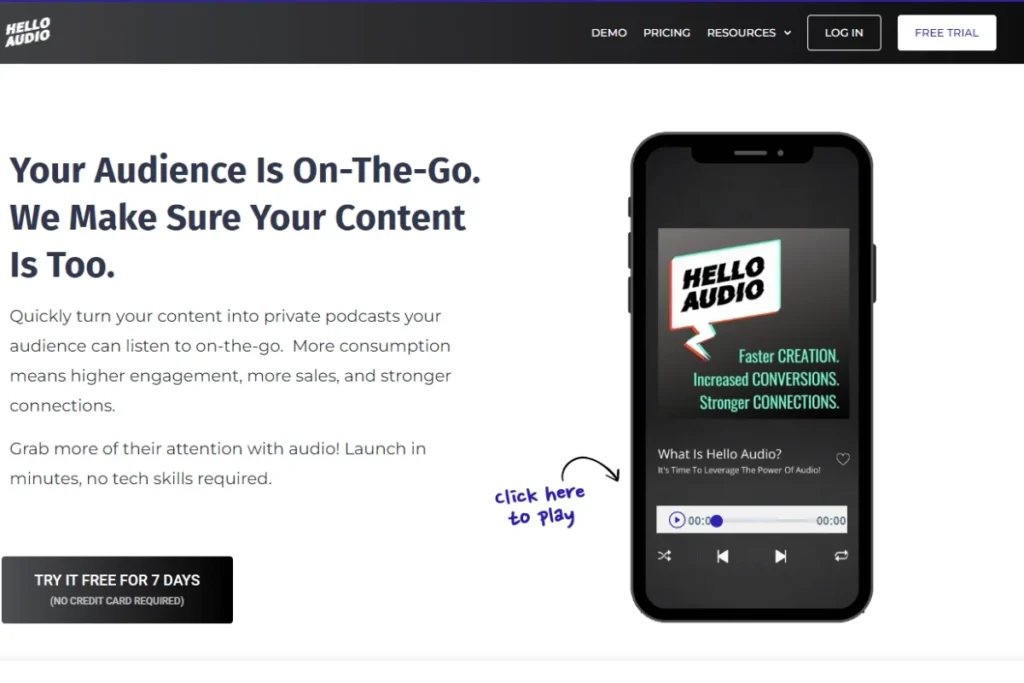
Hello Audio is an audio content host that delivers your content as private podcasts to listeners via Spotify, Podcast Addict, Overcast, etc. Its intuitive design and built-in content management features make it the best platform for hosting and distributing online courses.
Our platform also lets you curate the course content for your target audience to optimize engagement.
Here’s a quick overview of Hello Audio’s features:
- User-friendly drag-and-drop features to simplify navigation and help you organize the materials into themes or folders.
- Built-in editing tools to clean up audio recordings, making them clearly audible for your listeners.
- Automated actions to help you suggest content to listeners based on their interests and user behaviors.
- Supports audio for visually impaired audiences and auto-generated transcripts for learners with hearing impairments.
- Integrates with payment processing tools like Zapier to simplify how learners pay for courses.
- Provides among the best online community platforms to help you grow a loyal following for your brand.
- Advanced analytics to help you monitor the course’s performance and how learners interact with the content.
- Built-in tools to easily repurpose past content into private podcasts that you can share with your students to learn on the go.
Learn how our happy client, Lisa DeLugo, enhanced her coaching courses with private podcast feeds using Hello Audio.
Curious to see Hello Audio in action? Book an instant demo and see how our platform helps you connect with your audience.
2. Udemy
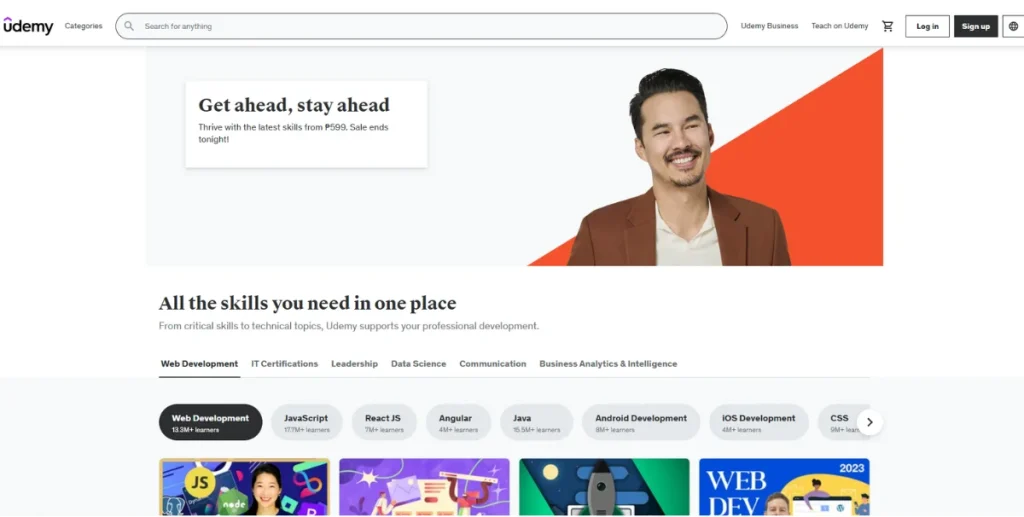
Udemy is a popular hosting platform with over 200,000 courses. Educators use it for its multilingual support features, which allow them to localize their courses for overseas students.
Udemy also supports self-paced learning, allowing students to start and finish their enrolled courses at their discretion.
The only drawback is that Udemy doesn’t provide channels for instructors to interact with their students, so you might want to consider other Udemy alternatives.
3. Teachable
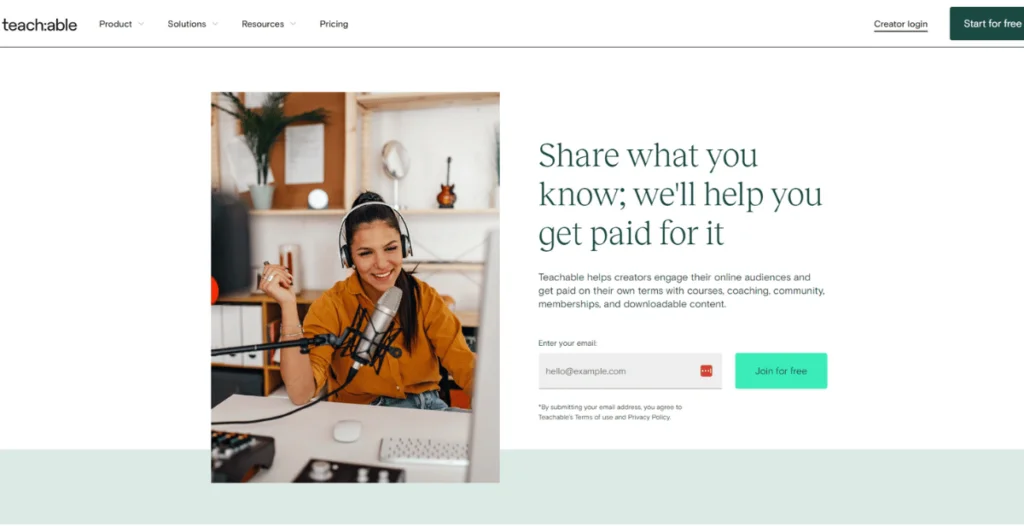
Teachable is an easy-to-use platform, especially for a novice online tutor. You can use it to upload diverse content types, including video tutorials and quizzes.
Even better, Teachable provides customizable landing pages, which you can build to avoid creating a separate website.
Our main concern with Teachable is that it lacks a community builder essential for marketing online courses.
4. Skillshare
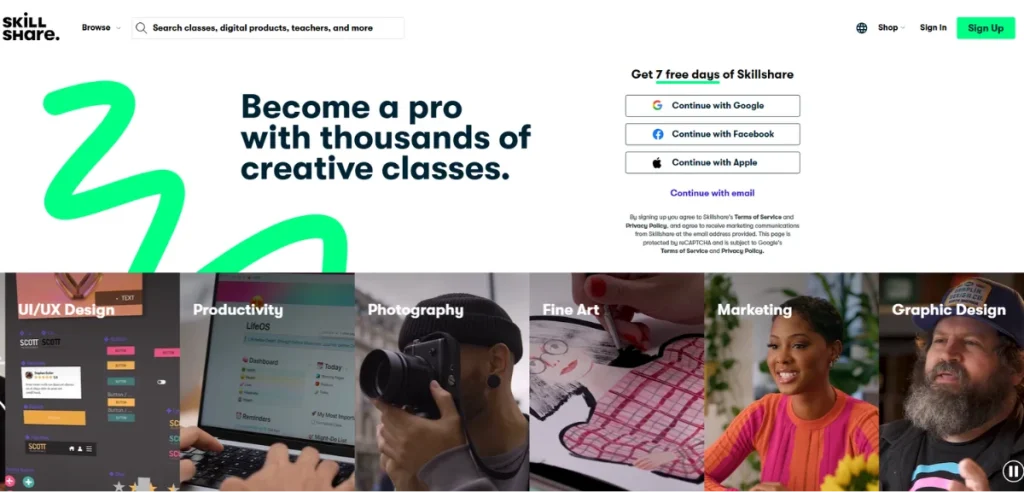
Skillshare provides a platform for hosting and distributing your online courses. The platform requires learners to purchase monthly plans to access the course catalog.
Skillshare also provides a comment section that you can use to interact with students and build an online community.
However, Skillshare’s compensation structure for tutors makes it difficult to generate significant revenue unless you enroll hundreds of students.
Common Mistakes to Avoid When Marketing Online Courses
Here are common mistakes educators make when promoting their online courses and how to avoid them:
- Not Defining Your Target Audience: Avoid trying to appeal to a broad audience, as this often makes your messaging vague. Instead, define your ideal client profile and tailor your marketing strategy to the target audience.
- Unclear Value Proposition: Do not message potential students without a clear plan. We recommend identifying major pain points and outlining how your course solves them.
- Overlooking Analytics: Ignoring your performance metrics results in missed chances for continuous improvement. Always monitor your analytics and refine your marketing strategy to appeal to your audience.
- Not Following Up on Leads: Any lead you do not nurture is a missed opportunity for your business. Implement a follow-up plan that includes email marketing and freebies to increase conversion rates.
- Inconsistent Branding: A disjointed messaging strategy tarnishes your brand image and credibility. Use a cohesive marketing strategy with consistent visuals and messaging.
- Overlooking SEO: Poor SEO strategies make your online course and brand invisible to your target audience. Create a dynamic website and invest in SEO to boost your rank on SERPs.
- Ignoring Social Media Marketing: Inconsistent social media activity reduces your brand’s visibility and memorability. Be active on social media, regularly post content, and run contests and giveaways to stimulate engagement.
- Poor Pricing: Overpricing your course might put off potential students, while underpricing it might lower its perceived value. Price your online course competitively to boost public perception and build customer confidence.

Best Practices for Marketing an Online Course
Here’s a cheat code for marketing your online course to boost enrolment rates:
- Create a Landing Page: Build a landing page where interested students can visit to register or get more details about the course.
- Use Lead Magnets: Offer lead magnets like checklists, industry cheat sheets, templates, and revision materials to encourage site visitors to submit their emails and consent to promotional messages.
- Promote the Course on Social Media: Broadcast the online course across your social media platforms to reach a wider audience.
- Have an SEO Strategy: Use relevant keywords in your course titles and descriptions to help your landing pages rank in organic searches.
- Use Affiliate Programs: Incentivize your affiliate program to encourage creators and marketers to promote your course. This can reduce your marketing expenses as you only pay for successful conversions.
- Host Webinars: Organize webinars where you offer free mini-courses. You can later use content repurposing tools to convert the webinars into private podcasts for your exclusive audience.
- Build an Online Community: Learn how to build an online community for your brand, where you can market your online courses or leverage their engagement to enhance online visibility.
- Post Student Testimonials: Share student success stories to nudge potential leads to trust your brand and enroll in your online course.

Frequently Asked Questions (FAQs)
Here are answers to questions we often receive from educators offering online courses:
What Metrics Should I Track to Measure Marketing Success?
Below are proven methods of measuring marketing success:
- Conversion: Check how many people complete the targeted action, such as signing up for freebies or enrolling for the course.
- Engagement: Monitor how people interact with your marketing messages, including likes, shares, and comments on your social media posts.
- Click-Through-Rate: Track how many people click on your promotional messages to go to your course website or landing page.
What Are Some Cost-Effective Marketing Strategies for Beginners?
The most cost-effective marketing strategies for beginners include email marketing, social media marketing, and referral programs.
These strategies help you generate leads without incurring huge marketing costs, increasing your ROI.
Can Free Content Like Ebooks or Guides Drive Course Sales?
Yes. Freebies like ebooks and guides are effective for building an email list that you can use to nurture the leads into actual sales and course enrollments.
Conclusion – How to Market an Online Course
To wrap it up, marketing online courses is not a one-off event. You must promote your online courses continuously to maintain online visibility and generate leads.
You must also host the courses on a user-friendly platform for easy access and to give your students a positive learning experience.
Hello Audio lets you curate your online courses for your audience, including leveraged automated actions to recommend new courses or topics. Our platform also helps you share content on distribution networks to boost visibility to interested learners.
Try Hello Audio’s 7-day free trial and start sharing your online courses as private podcasts!




